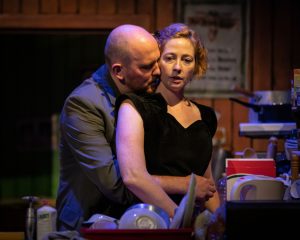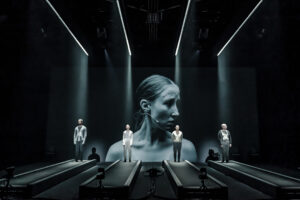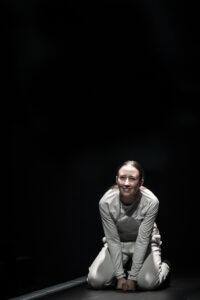Martin McDonagh’s early work hints at greatness to come.
★★★

We’ve come to know Martin McDonagh very well over the last 25 years. Revivals of his plays The Cripple Of Inishmaan with Daniel Radcliffe and The Lieutenant of Inishmore with Aidan Turner were West End triumphs and confirmed his status as a leading playwright.
He continues to dazzle with hits like Hangmen and A Very Very Very Dark Matter. Then there are his films In Bruges, Three Billboards Outside Ebbing, Missouri, and more.
His work is notable for unpredictable storytelling, humorous dialogue and sudden violent shocks. And that’s all here in his first play The Beauty Queen Of Leenane, revived in a co-production by Chichester Festival Theatre and the Lyric Hammersmith.
The play centres on the relationship between 70 year old Mag, played by Ingrid Craigie, and her 40 year old daughter and carer Maureen (Orla Fitzgerald). The pair are isolated in a run-down Irish village in the mid-1990s. They only have each other, and this dependency has led to a toxic, indeed abusive relationship in which each torments the other in petty, or occasionally significant, ways.
Mag empties her chamber pot into the kitchen sink each morning to the annoyance of her daughter, Maureen only buys biscuits her mother dislikes. It reminded me of the co-dependent parent-child relationship that formed the heart of the classic TV sitcom Steptoe And Son.
Mag schemes to undermine Maureen in order to keep her at home. She destroys important notes and letters. The mentally unstable daughter, having apparently sacrificed her life to perform her filial duty, crosses from care to cruelty. The relationship is dark, sinister even, but the interplay between them is also amusing.
Both actors convince in the ease of their conversation, which sounds like they have been having the same exchanges for the last 20 years, much like a Becket or Pinter play. I particularly enjoyed the animation and barely contained look of triumph that Ingrid Craigie gave when her character had secret knowledge about the truth of a situation, and mischievously led Maureen on in her lie about it. Orla Fitzgerald was tremendous whenever she tried to lord it over her mother, stepping out with hips swaying.
An absorbing look at a toxic relationship
The co-dependency is threatened when Pato appears on the scene. Although a local, he is also an outsider, having emigrated to London. England is always seen as a malign influence in this play. The country that has destroyed Ireland and continues to ruin this village. It’s a relationship perhaps not dissimilar to that of Mag and Maureen.
Pato forms a liaison with Maureen, whom he calls his beauty queen, and threatens to take her away to the promised land of America. Not if Mag has anything to do with it. A violent and unhappy end seems inevitable.

Adam Best is moving as Pato, a sad lonely man set apart from the English by his Irish village origins and by the prejudice and dangers of London’s building sites. At the beginning of act two, he writes a letter to Maureen about his life and wishes that is truly heartbreaking.
The fourth member of the cast is Kwaku Fortune who portrays Pato’s brother Ray. His main role is that of a miserable messenger but in his short scenes he convincingly illustrates the dead end nature of life in Leenane, which for him lies mainly in an obsession with Australian soaps and a surly attitude.
The set by Good Teeth Theatre was so dingy you could almost smell the urine. The rainy monotone backwall projection was appropriately bleak. The set was spread out with Mag’s armchair and a stove on one side and Maureen’s chair and kitchen area on the other. This suggested a boxing ring in which each protagonist had their corner. The sound by Anna Clock that accompanies the scenes breaks was equally desolate.
Martin McDonagh certainly has a way with words, and if The Beauty Queen Of Leenane isn’t as laugh-out-loud funny nor as original in its subject matter as his later work, it is still absorbing. Rachel O’Riordan’s production does it proud.
The Beauty Queen Of Leenane is performing in Chichester’s Minerva Theatre until 2 October and then at the Lyric Hammersmith Theatre from 6 October to 9 November 2021

